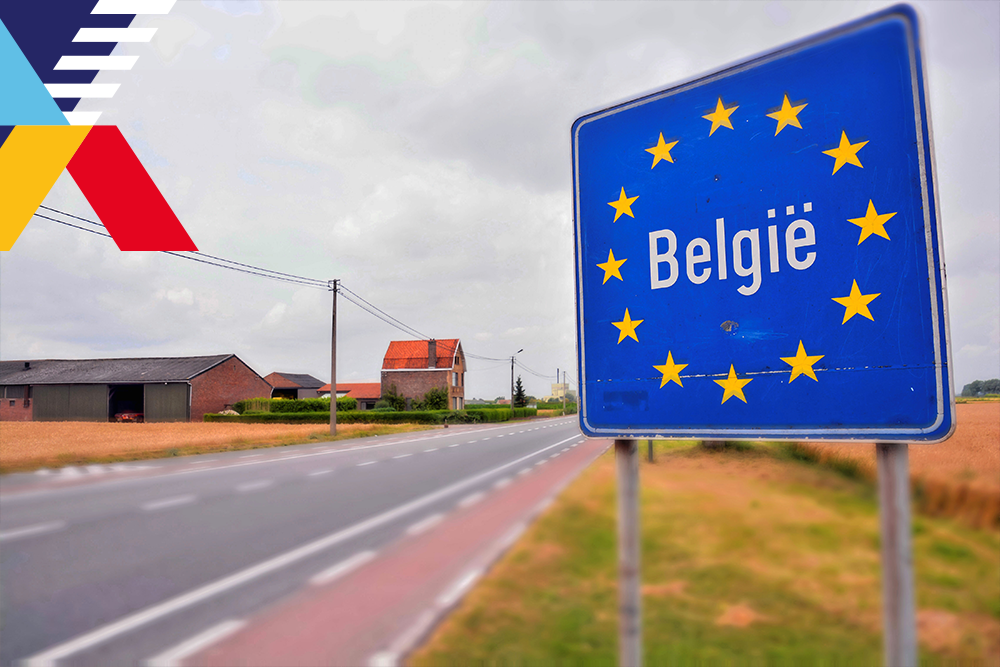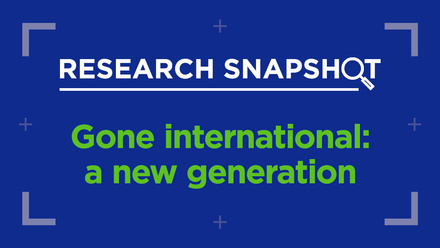Learning from Flanders’ inclusive mobility roadmap

As part of the EAIE 2021 Conversation Starter series, this essay continues our exploration of taking braver and bolder steps forward in international education. The third essay in the series gives a detailed look at the Flemish approach to widening participation of underrepresented groups in mobility programmes. Read about the tools created and action taken in the past five years.
Just last year, the European Higher Education Area (EHEA) renewed its 2030 aspiration to see 20% of member states’ graduates undertaking a study abroad experience (Rome Communiqué, 2020). Although the trend of internationalisation is growing, and the EHEA has paved the way for large-scale student mobility and increased its quality and attractiveness, only a few European countries have implemented strategies to strengthen the social dimension in mobility programmes (European Commission/EACEA/Eurydice, 2020). Indeed, according to European Commission official data, the portion of the student population receiving special needs financial support is stagnating between 0.11% and 0.15% (European Commission, 2009–2018). As the new Erasmus+ Programme and the EHEA aim to achieve better inclusiveness in mobility programmes, it can be helpful to explore examples of policies and practices where inclusion is centrally situated. The Flemish Community (Belgium) approach to widening participation of underrepresented groups in mobility programmes is one such roadmap worth considering.
Flemish policies
The Flemish government adopted the ‘Brains on the Move’ mobility action plan in 2013. The action plan is composed of a broad range of initiatives that contribute to the further realisation of internationally-oriented, high-quality education in Flanders. The focus lies on the mobility of students. In this internationalisation strategy, inclusion was given a central place and a benchmark was set concerning the mobility of underrepresented groups in higher education. As a result, the Flemish government strives for 33% of all outgoing mobile students to belong to underrepresented groups. Currently, these groups are defined as students with disabilities, students from economically disadvantaged backgrounds and working students.
Furthermore, concrete actions have been taken to promote mobility among these groups. A monthly top-up scholarship is available for these students and at least 25% of the Flemish outward mobility grants must be awarded to students from underrepresented groups. The implication is that, in order to use the full budget that is available for mobility actions, there must be enough applications from students from underrepresented groups. So the opportunities for all mobile students (underrepresented or otherwise) are connected, compelling higher education institutions to identify these groups of students and encourage them to apply for a mobility grant.
The portion of the student population receiving special needs financial support is stagnating between 0.11% and 0.15%
Conferences and communication campaigns are used to stimulate underrepresented students to go abroad. For example, the 2015 Handbook of the Flemish Community of Belgium on Study and Internships Abroad includes one chapter dedicated to students with disabilities and features mobility portraits of disadvantaged students. In addition, the Flemish Erasmus+ National Agency developed an easy funding application process for preparatory visits, which allow a trusted person/coach to accompany a student with disabilities on an advance visit to their mobility destination to ensure that any reasonable adjustments recommended for the student are put in place where possible; if not, alternatives are negotiated.
The Flemish government also created the Support Centre for Inclusive Higher Education (SIHO) to support higher education institutions. It supports both policymakers and higher education institutions to implement equity and inclusion measures. Drawing together international officers and inclusion/disability officers from the 18 Flemish higher education institutions, SIHO created a learning network on the topic of inclusive mobility. The network supports international officers and policymakers in planning and making their daily practices and policies on mobility more inclusive. Based on the identified needs, SIHO develops tools to support higher education institutions, national agencies and ministries of education to implement a sustainable mobility strategy at the institutional and/or national level. It also actively contributes to international cooperation on inclusive mobility, by coordinating the Inclusive Mobility Alliance (IMA), an alliance of European organisations that aims to make mobility inclusive for students and youth from disadvantaged and underrepresented groups.
As the Flemish internationalisation strategy has been in place since 2013, Flanders has generated five years of comparable data on this issue, which is fairly unique in the EHEA. The percentage of underrepresented students is increasing. Statistics show that in the academic year 2018–19, 22% of all “initial mobile degrees” are attributed to students from underrepresented groups. A new Flemish internationalisation strategy is currently under development for the period 2021–2030 and will have a universal design as a transversal theme, emphasising that mobility and other internationalisation actions should be an option for everyone.
Supportive resources for all stakeholders
One of the biggest barriers reported by inclusion officers and international officers is the lack of current and reliable information on the available regulations, funding and support services in the different countries and difficulties with the portability of support services for students with disabilities (Flemish Education Council, 2018). To overcome this challenge, the Flemish Ministry of Education and Training and SIHO have coordinated the EPFIME project (Establishing a thought-out Policy Framework for Inclusive Mobility across Europe). EPFIME is a two-year (2019–2021) project co-funded by Erasmus+. During this project, an international consortium and experts examined in-depth the needs and expectations for inclusive mobility of national authorities, students with disabilities and higher education institutions across Europe. Their focus was improved collaboration between stakeholders to ensure the quality and the transferability of support services for both incoming and outgoing students with disabilities in exchange programmes.
Mobility and other internationalisation actions should be an option for everyone
Based on desk research, focus groups and large-scale surveys (collecting 1134 responses from students with disabilities, 114 higher education institutions and 23 ministries of education across the EHEA), a research report and a booklet created in November 2020, contains policy recommendations and good practices on making mobility programmes more inclusive for students with disabilities. In April 2021, the platform InclusiveMobility.eu was launched. Developed jointly by the Erasmus Student Network and SIHO, the platform strives to serve as a one-stop shop for all information about inclusive mobility, serving all relevant stakeholders: higher education institutions, national agencies for Erasmus+, ministries of education and students. The platform offers stakeholders the opportunity to provide detailed information about their strategies, processes and support services on inclusive mobility in the EHEA. Prospective students who are considering studying abroad can access relevant information quickly and easily. The platform also provides students with disabilities with clear information about existing mobility opportunities and testimonials from other students who went abroad. Meanwhile, the platform is connected to the inclusivemobilityframework.eu website, including the project outcomes: a Toolbox on Inclusive Mobility, Frameworks, Self-assessment tools and Guidelines to make mobility programmes more inclusive, providing higher education institutions, national agencies for Erasmus+ and ministries of education with strategic objectives and concrete action points for implementing inclusive mobility strategies and processes at the institutional and/or national level.
Strengthening social inclusion
The Flemish Ministry of Education and Training and SIHO are also coordinating the PLAR-4-SIMP project (Peer Learning Activities and Resources for Social Inclusion in Mobility Programmes), a 2-year (2020–2022) project co-funded by Erasmus+. This project expands on the EPFIME project by focusing more broadly on disadvantaged, vulnerable and underrepresented students.
This project supports peer-learning activities on social inclusion in mobility programmes, and works to strengthen mutual learning and deepen the exchange of practices between EHEA countries at different implementation stages. Notably, SIHO will also publish a comprehensive policy report, data matrix and a database on national social inclusion measures and practices, which will purposefully highlight innovative inclusive policy initiatives. Furthermore, the consortium will develop a hands-on communication package to communicate the benefits of outward mobility towards students of underrepresented groups in an inclusive way. Following the structure of the EPFIME framework, a blended training package will also be developed to equip staff of higher education authorities and institutions with skills, knowledge, attitudes and tools required to best organise inclusive student mobility in the 21st century. These tools will be integrated into the Inclusivemobility.eu website by February 2022 and are directly implementable. As such, they will contribute to a more inclusive new Erasmus+ programme in the short term.
Conclusion
As the new Erasmus+ Programme and the EHEA aim to achieve greater inclusiveness in mobility programmes, higher education authorities and institutions should take bold action to implement reforms to widen the participation of students from disadvantaged groups. Inspiration and support can be found in a variety of places. Flemish policies, for example, offer useful current examples of national-level action, while the outputs of a number of European inclusive mobility projects provide practical inspiration at more operational levels. With these various tools, higher education institutions, national agencies and ministries of education can be empowered to implement inclusive mobility strategies at all levels. In providing students with fair opportunities to participate in international exchange programmes, higher education authorities and institutions can enhance students’ personal development, prospects for employment and their active engagement in democratic citizenship for generations to come (Paris Communiqué 2018). The Flemish Community and SIHO are excited to be at the forefront of this work.
Questions for Discussion
1. Does your country have a nation-wide policy to expand access to mobility? Is it being acted upon? Has it borne results?
2. Is there anything from the Flemish experience that your country could replicate?
3. At your institution, what is the ratio of disadvantaged, vulnerable and underrepresented groups accessing mobility, compared to their percentage of the total student population?
4. How does your institution support inclusive mobility? Is there anything from the Flemish experience that you could replicate at the institutional level?
References
European Commission/EACEA/Eurydice (2020). The European Higher Education Area in 2020: Bologna Process Implementation Report. Luxembourg: Publications Office of the European Union.
Flemish Education Council (2018). Advies over de internationale mobiliteit van studenten met een functiebeperking. Vlaamse Onderwijsraad. Brussels.
Flemish Government (2013). Brains on the Move! Action plan for mobility. Brussels: Flemish Government.
Paris Communiqué (2018). EHEA ministerial conference Paris 2018. Retrieved from European Higher Education Area website: http://ehea.info/page-ministerial-declarations-and-communiques
Rome Communiqué (2020). EHEA ministerial Rome Conference 2020. Retrieved from European Higher Education Area website: http://ehea.info/page-ministerial-declarations-and-communiques






